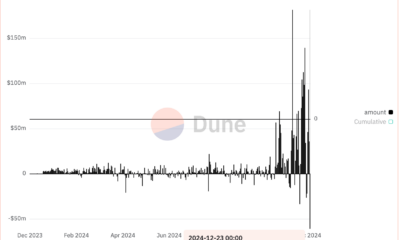mica
WSPN raises $30m to expand stablecoin infrastructure
Published
4 months agoon
By
admin

Stablecoin infrastructure startup WSPN has secured $30 million in a seed round to boost its stablecoin adoption mission.
Worldwide Stablecoin Payment Network — also known as WSPN — has attracted $30 million in seed funding to double down on its “Stablecoin 2.0” approach. In an Aug. 16 press release, the firm said the round was led by Foresight Venture and Folius Ventures, with participation from Hash Global, Generative Ventures, Yunqi Partners, and RedPoint China, among others.
Founded by former employees of Visa and Paxos, WSPN says it has secured backing from over 30 cryptocurrency exchanges, more than 10 wallets, and a range of payment institutions and market makers, without naming them.
The Singapore-based startup also boasts its own stablecoin products like WUSD and WEUR, which are backed by cash, cash equivalents, and short-term treasury bills, according to the project’s official website.
Governance token to rule stablecoins
While the financial terms of the round were not disclosed, WSPN’s “Stablecoin 2.0” approach centers around the introduction of a “governance token,” designed to allow users to share in the ecosystem’s long-term value and influence its development trajectory. The firm plans to implement on-chain voting, enabling token holders to participate in key decision-making processes, ensuring transparency and community-driven governance, the press release reads.
Commenting on the funding, WSPN CEO Raymond Yuan said the “substantial capital injection” will accelerate the startup’s efforts to “bring about the next generation of stablecoin infrastructure.”
The funding comes at a time of uncertainty for the stablecoin market. In mid-July, Tether CEO Paolo Ardoino raised concerns that Europe’s MiCA regulations, with their stringent cash reserve requirements, could create systemic risks for banks.
Although MiCA has prompted a rush among issuers to comply, blockchain analytics firm Kaiko notes that only one stablecoin provider, Circle, has so far benefited from the new regulations. As of now, there are no indications that Tether intends to register in the EU to operate under the new regulatory framework.
Source link
You may like


Solana beats Ethereum in a key metric 3 months in a row


SCENE’s 2024 Person of the Year: Iggy Azalea


BTC Risks Falling To $20K If This Happens


Most Layer 2 solutions are still struggling with scalability


Here’s why Stellar Price Could Go Parabolic Soon


Perp-Focused HyperLiquid Experiences Record $60M in USDC Net Outflows
Altcoins
USDC Becomes First Stablecoin To Gain Compliance With New Canadian Crypto Asset Requirements
Published
2 weeks agoon
December 6, 2024By
admin
Circle announced this week that USDC became the first stablecoin to gain compliance with new Canadian digital asset regulations.
Canada’s new regulations call for delisting noncompliant stablecoins after December 31st.
Circle’s compliance means USDC, which aims to maintain a 1:1 peg with the US dollar, can trade on crypto exchanges in the Canadian market, according to a new press release.
Dante Disparte, chief strategy officer and head of global policy at Circle, says the new development underscores the stablecoin issuer’s regulatory efforts.
“The Canadian Securities Administrators’ proactive approach in providing a digital asset regulatory framework reinforces the integrity of digital asset markets, while ensuring continued reliance on USDC across Canada’s burgeoning ecosystem.”
The announcement comes as Circle launched a new wave of layoffs, Bloomberg reports. A company spokesperson tells the news outlet the downsizing was routine and represented less than 6% of the firm’s workforce.
“Circle regularly reviews our investments and expenses. This includes investing in teams and operational infrastructure that need to grow, while marginally reducing spend and some roles in other areas of the business.”
This summer, USDC and Circle’s euro-pegged stablecoin EURC also achieved compliance with the European Union’s Markets in Crypto Assets (MiCA) regulations.
MiCA is upcoming EU legislation that will provide rules covering the supervision, consumer protection and environmental safeguards of crypto assets.
The law includes measures that aim to reduce financial crimes including market manipulation, money laundering and terrorist financing, and it places stablecoin issuers under the European Banking Authority while requiring them to hold sufficient liquid reserves.
It’s also scheduled to take effect in December 2024.
Don’t Miss a Beat – Subscribe to get email alerts delivered directly to your inbox
Check Price Action
Follow us on X, Facebook and Telegram
Surf The Daily Hodl Mix
 

Disclaimer: Opinions expressed at The Daily Hodl are not investment advice. Investors should do their due diligence before making any high-risk investments in Bitcoin, cryptocurrency or digital assets. Please be advised that your transfers and trades are at your own risk, and any losses you may incur are your responsibility. The Daily Hodl does not recommend the buying or selling of any cryptocurrencies or digital assets, nor is The Daily Hodl an investment advisor. Please note that The Daily Hodl participates in affiliate marketing.
Generated Image: Midjourney
Source link
mica
Is Bitcoin Self-Custody Under Threat in Europe?
Published
3 weeks agoon
December 3, 2024By
admin

For centuries, self-custody has symbolized financial autonomy, enabling individuals to secure their wealth—from gold to cash—without intermediaries. Bitcoin extends this principle into the digital realm, offering a censorship-resistant, decentralized way to hold assets. Yet, upcoming European regulations under the Markets in Crypto-Assets Regulation (MiCA) and the Transfer of Funds Regulation (TFR) threaten to complicate self-custody for Bitcoin users.
A New Regulatory Era
MiCA, adopted in April 2023, aims to regulate crypto-assets comprehensively in the EU. The revised TFR applies the “Travel Rule” to Bitcoin transactions, requiring detailed sender and recipient information for compliance. These changes will come into effect in 2025, making it harder for Europeans to interact with Bitcoin self-custody wallets without cryptographic proof of ownership.
One proposed solution is the “Satoshi Test,” where users verify wallet ownership by sending a small amount of Bitcoin (e.g., one satoshi) from their wallet to the exchange. While simple for existing holders, this process creates a paradox for new users: they need Bitcoin to verify ownership but cannot acquire Bitcoin without passing the test. This “catch-22” risks alienating new adopters, steering them toward custodial solutions that compromise Bitcoin’s ethos of decentralization and financial sovereignty.
Privacy and Security Risks
In an effort to comply with the new regulations, some exchanges are exploring alternatives to the Satoshi Test; These involve using end-to-end encrypted messages signed using the private key to confirm ownership of the wallet cryptographically for example via the WalletConnect Network. This preserves privacy and yet helps institutions to be compliant.
The core ethos of Bitcoin technology and cryptocurrencies is decentralization and privacy. Centralizing sensitive user data not only creates attractive targets for cybercriminals but also contradicts the principles that have driven the adoption of cryptocurrencies. The recent history of data breaches in the financial sector underscores the dangers of storing large amounts of personal data in centralized repositories.
“Not Your Keys, Not Your Coins”
The adage “Not your keys, not your coins” serves as a reminder of Bitcoin’s core philosophy: control over private keys equals control over assets. Users must carefully evaluate exchanges’ self-custody support, as cumbersome processes or centralized data storage undermine Bitcoin’s promise of financial freedom.
The TFR is only the beginning. Future legislation, like the proposed Payment Services Directive 3 (PSD3), signals growing regulatory scrutiny of Bitcoin self-custody. To preserve Bitcoin’s core values, the industry must proactively develop solutions that comply with regulations while protecting user privacy.
This is a pivotal moment for Bitcoin in Europe. Users should advocate for exchanges that prioritize self-custody and privacy-preserving measures. Exchanges, in turn, must innovate to comply with regulations while staying true to Bitcoin’s decentralized principles.
As Europe tightens its regulatory framework, the choices made by Bitcoin users, exchanges, and regulators will determine whether Bitcoin continues to empower individuals or becomes entangled in centralized systems. By championing privacy and self-custody, we can ensure Bitcoin remains a tool for financial sovereignty and freedom.
This is a guest post by Jess Houlgrave. Opinions expressed are entirely their own and do not necessarily reflect those of BTC Inc or Bitcoin Magazine.
Source link
mica
Tether ends support for EURT stablecoin amid MiCA compliance
Published
4 weeks agoon
November 27, 2024By
admin

Tether is discontinuing its support for the Euro-pegged stablecoin EURT, and will no longer accept new issuance requests.
The Tether (USDT) issuer notified its community and the broader industry that the company has ended EURT support via a blog post on Nov. 27.
According to the announcement, the decision to halt the minting of the Euro-pegged stablecoin comes amid the industry’s adjustment to the regulatory environment around stablecoins. In particular, Tether has taken this step in response to the European Union’s stablecoin regulation as outlined in the Markets in Crypto-Assets regulation.
MiCA rolled out for stablecoins in June, with full implementation of the comprehensive regulatory regime set for December 30, 2024.
“After careful consideration, we have made the decision to discontinue support for EUR₮. As such, Tether has ceased minting EUR₮, with the last acquisition request processed in 2022, and new EUR₮ issuance requests are no longer accepted,” Tether wrote.
The USDT issuer is choosing to end EURT support “until a more risk-averse framework is in place.” Customers with EURT balances on blockchains have until November 27, 2025, to redeem their holdings.
Tether previously disclosed plans to halt EURT across several chains, including EOS, Omni, Kusama and Algorand. However, this has changed with stringent rules around asset-referenced tokens. Some exchanges announced the delisting of the fiat-backed token this year. They include OKX, Bitstamp and Coinbase.
As the crypto platform takes this step, it notes that its focus will now be on other initiatives. These include Tether’s support for recently launched MiCA-compliant stablecoins USDQ and EURQ.
Tether recently invested in USDQ and EURQ issuer Quantoz Payments, which crypto.news highlighted last week. Tether’s blockchain technology solution Hadron by Tether will power this integration.
The EURT stablecoin was launched in 2016.
Source link

Solana beats Ethereum in a key metric 3 months in a row

SCENE’s 2024 Person of the Year: Iggy Azalea

BTC Risks Falling To $20K If This Happens

Most Layer 2 solutions are still struggling with scalability

Here’s why Stellar Price Could Go Parabolic Soon

Perp-Focused HyperLiquid Experiences Record $60M in USDC Net Outflows

Experts say these 3 altcoins will rally 3,000% soon, and XRP isn’t one of them

Robert Kiyosaki Hints At Economic Depression Ahead, What It Means For BTC?

BNB Steadies Above Support: Will Bullish Momentum Return?

Metaplanet makes largest Bitcoin bet, acquires nearly 620 BTC

Tron’s Justin Sun Offloads 50% ETH Holdings, Ethereum Price Crash Imminent?

Investors bet on this $0.0013 token destined to leave Cardano and Shiba Inu behind

End of Altcoin Season? Glassnode Co-Founders Warn Alts in Danger of Lagging Behind After Last Week’s Correction

Can Pi Network Price Triple Before 2024 Ends?

XRP’s $5, $10 goals are trending, but this altcoin with 7,400% potential takes the spotlight
182267361726451435

Why Did Trump Change His Mind on Bitcoin?

Top Crypto News Headlines of The Week

New U.S. president must bring clarity to crypto regulation, analyst says

Will XRP Price Defend $0.5 Support If SEC Decides to Appeal?

Bitcoin Open-Source Development Takes The Stage In Nashville

Ethereum, Solana touch key levels as Bitcoin spikes

Bitcoin 20% Surge In 3 Weeks Teases Record-Breaking Potential

Ethereum Crash A Buying Opportunity? This Whale Thinks So

Shiba Inu Price Slips 4% as 3500% Burn Rate Surge Fails to Halt Correction

Washington financial watchdog warns of scam involving fake crypto ‘professors’

‘Hamster Kombat’ Airdrop Delayed as Pre-Market Trading for Telegram Game Expands

Citigroup Executive Steps Down To Explore Crypto
Mostbet Güvenilir Mi – Casino Bonus 2024

NoOnes Bitcoin Philosophy: Everyone Eats
Trending

 3 months ago
3 months ago182267361726451435

 Donald Trump5 months ago
Donald Trump5 months agoWhy Did Trump Change His Mind on Bitcoin?

 24/7 Cryptocurrency News4 months ago
24/7 Cryptocurrency News4 months agoTop Crypto News Headlines of The Week

 News4 months ago
News4 months agoNew U.S. president must bring clarity to crypto regulation, analyst says

 Price analysis4 months ago
Price analysis4 months agoWill XRP Price Defend $0.5 Support If SEC Decides to Appeal?

 Opinion5 months ago
Opinion5 months agoBitcoin Open-Source Development Takes The Stage In Nashville

 Bitcoin5 months ago
Bitcoin5 months agoEthereum, Solana touch key levels as Bitcoin spikes

 Bitcoin5 months ago
Bitcoin5 months agoBitcoin 20% Surge In 3 Weeks Teases Record-Breaking Potential


